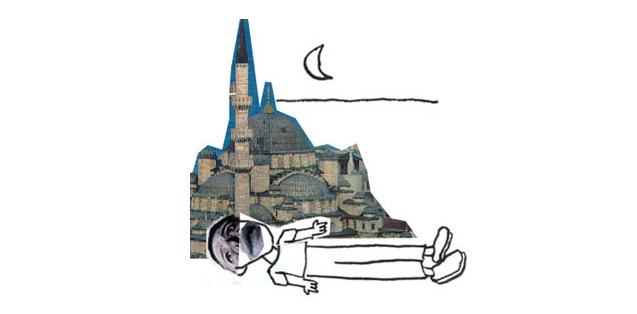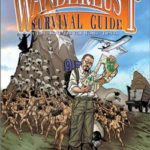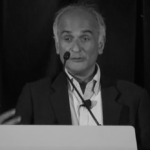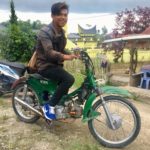One man’s adventures in getting drugged and robbed in Istanbul
By Rolf Potts
I.
When the date-rape drug finally wore off to the point where I could think and function, I found myself facedown in a darkened park not far from Istanbul’s Blue Mosque. For an instant, it was as if I’d been born all over again, erased and re-rendered. I remembered nothing: who I was, why I was there, what I’d ever been doing before that moment.
Instinct told me to stand up. Shaking like a junky, I drew myself up to my haunches and pushed with my legs. I rose to my full height for just an instant before something malfunctioned and my whole body veered rigidly to one side. I fell over like a windup toy on a rumpled bed sheet; my shoulder hit the pavement first, then my face.
Blood welled on my cheekbone as a hazy understanding began to form. I patted down my pockets: my petty cash was gone, as was my wallet, my leather belt and my Swiss Army knife. I felt along my belly for my hidden money belt, but it was gone too — passport, traveler’s checks and all. Oddly, my red spiral notebook and my recently purchased Penguin anthology of Middle Eastern mythology were still jammed into my back pocket.
Pulling myself into an upright position, I took a few deep, deliberate breaths. Sitting there, drugged and dazed in the dim park, I strained to reconstruct what had just happened.
Up until the moment I lost consciousness, my day in Istanbul had already been exceptional — enlivened by unexpected camaraderie, by uncommon novelties. In one afternoon, I’d met more strange people than the rest of my brief days in Turkey combined. Trying to determine at what point I went wrong would be no easy task.
Technically, I wasn’t supposed to be adrift in the city that day, since I’d been scheduled to join a pre-planned Cairo-bound overland trip the day before. However, when the truck and trip leader never arrived for the pre-departure meeting, I found myself with an extra day to kill in Istanbul.
Since I’d already spent three days touring Istanbul’s marvelous historical attractions — from the lavish Ottoman halls of Topkapi Palace to the crowded dagger-and-hookah-pipe stands of the Great Bazaar — I decided to devote my extra day in Istanbul to random wandering. Strolling the parks and alleys of the Sultanahmet tourist district with no particular goal, I spent my morning taking in the details I’d been too busy to notice when I first arrived.
Istanbul has long enjoyed a reputation of mystery and intrigue — of East and West co-mingling in grand palaces and smoky alleyways: a place where dreamers, schemers and pilgrims go to lose themselves. As I walked that day through the ancient neighborhood where the Bosphorous and the Golden Horn meet the Sea of Marmara, everything I saw seemed to contain a hidden currency. When a tout in Sultanahmet Square bullied me into his carpet shop, I was interested less in the Persian-styled rugs than the 1500 year-old Byzantine column that slanted crazily through the recently poured concrete floor of the showroom. When I asked an old Turkish man how I might find an “eczane,” he gave me directions to the pharmacy in shrill, German-inflected English that made him sound like Colonel Klink from “Hogan’s Heroes.” When I walked past the earthquake refugees camped out in the grass along the Hippodrome, I noticed that several of them clutched cell-phones. A little gypsy girl selling candy near the tram station wore an oversized Metallica concert-shirt cinched at the waist like a dress. Cats crouched in doorways and alleyways; seagulls soared over the minarets of the Blue Mosque. A neatly dressed Turkish boy sitting on the tram grinned shyly at me and whispered “fuck you,” as if in greeting.
Sometime around noon, an African teenager approached me near the Galata Bridge. His skin was as black as coffee, and he flopped after me in a loose-fitting pair of rubber sandals. “Hey man,” he called to me. “Where are you going today?”
Since this same guy had already approached me two other times in the past three days, I decided to yank his chain a little. “I’m going to Senegal today,” I said. “Don’t you want to come with me?”
A look of confusion came over the boy’s face. He’d told me he was from Senegal two days before, but no doubt he’d told dozens of other people since then. It was a few beats before he smiled in recognition. “Oh hey, I remember you. You’re Mr. America. You’re always alone, and you never want to meet any girls. Maybe you could meet a girl today, huh? You have a place to stay?”
“Yes, I still have a place to stay,” I said. “And no, I don’t need to meet any girls. I’m just looking for some place to eat lunch.”
“Why don’t you go to McDonald’s? American food for Mr. America, yes?”
“But Mr. America is in Turkey now,” I said. “So maybe he’ll eat Turkish food.”
“Turkish food is for Turkish people. McDonald’s is better for you. Maybe you can buy me a hamburger, OK? I want to try a McDonald’s.”
“You’ve never eaten at McDonald’s before?”
“McDonald’s is for Americans. I am so poor!”
Against my better judgment, I decided to indulge him. “What kind of hamburger do you want?”
“A big delicious one. And a Coca-Cola. I will wait right here until you come back.”
“If I buy you a hamburger, you have to come to McDonald’s and eat it with me.”
The Senegalese boy seemed to hesitate for a moment before falling into step with me. On our way to the restaurant, he told me his name was Ahmad. “Do you think I am very handsome?” he asked.
“I’m just buying you a burger, Ahmad. I don’t want to be your boyfriend.”
Ahmad let out an embarrassed laugh. “No, no,” he said. “I want to know, am I very handsome? Could I go to Sweden do you think?”
“What does Sweden have to do with whether or not you’re handsome?”
“I think rich Sweden women like boys from Africa. I want to go to Sweden with a rich woman.”
“Sweden is cold, Ahmad.”
“But I think rich women are very warm!”
At McDonald’s, I ordered two Big Mac meals. Ahmad temporarily forgot his hustler persona as he devoured the food in silence and stared around at the spotless, mass-produced interior. “That was my best food ever,” he said, somewhat dispassionately, when he’d finished. “Now I will help you find a pretty girl.”
“I was thinking of something else, Ahmad. How would you like to go out for a smoke?”
Ahmad’s face lit up and he leaned in toward me. “You smoke hash?” he said in a loud whisper. “I will find some for cheap price!”
“I don’t want to smoke hash,” I said. “I know something better.”
In the heart of the Sultanahmet tourist area — not far from Emporer Justinian’s 1400 year-old Church of the Holy Wisdom — I’d recently discovered a back alley water-pipe joint called the Enjoyer Cafe, which was run by a man who called himself Cici (pronounced like “G.G.”). Though the cafe was wedged between Internet rooms and kilim vendors, Cici’s homespun, adage-spewing charisma more than made up for the lack of authenticity. Thin, lazy-eyed and companionable, Cici would make his rounds as customers from every stripe of the tourist spectrum sat on cushions and pulled on the bubbling blue-glass pipes.
I’d first visited the Enjoyer Cafe (named for Cici’s mantra: “Enjoy your life!”) the night before, along with a few other clients from my postponed overland tour. Though my companions left when the tramlines closed, I stayed on the outdoor cushions and chatted with Cici about Islam and America until the cafe closed. Since Cici had sincerely asked me to come back, I’d decided to treat Ahmad to an afternoon at Cici’s hookahs.
Ahmad looked dubious the moment he saw Cici’s cafe. “Those are apple-smoke pipes,” he said. “Apple smoke doesn’t make you feel good. I will find some hash instead.”
“The smoke is not important,” I said. “I think it’s just a good place to relax and talk.”
“I am sorry. I must make an appointment with my brother. I can’t smoke with you today. I will find you a girlfriend later, OK?”
“Whatever you say, Ahmad.” I watched as the Senegalese teenager flopped off down the alley.
At the Enjoyer Cafe, Cici greeted me with a nervous smile. “I am glad you returned to talk to me,” he said. “But I am sorry to worry. Maybe it’s none of my business, but was that black boy your friend?”
“That was Ahmad. I wouldn’t call him a friend, necessarily. He’s just someone I know from walking around Sultanahmet. I just bought him a hamburger.”
Cici looked at me like I was crazy. “You must be careful, my friend. He is a bad boy, I think. Many Africans are not honest people. They come here only to cheat and steal.”
“I’m careful. Besides, I know Ahmad is a hustler, and Ahmad knows I know that. I think he’s harmless.”
“I am sorry. You are right. I only warn you to be careful because many people come to Turkey like blind men. Tourists, they come to take photos, but they don’t see past their cameras. Businessmen, they come to Turkey to trade, but they are blind to everything that doesn’t carry a price. Travelers, they look around, but they only see what is already in their mind. Do you know how you must come to Turkey, my friend?”
I already knew the answer (he’d given me a nearly-identical spiel in a different context the night before), but I didn’t want to throw off his rhythm. “How’s that?” I said.
“You must come to Turkey as a guest. Then you will look with your eyes and you will see. Not as a tourist with his camera or a traveler who looks and sees his own dreams. Be a guest of Turkey. A guest knows he is safe, because his hosts love him.”
“I’ll be your guest then, Cici. Do you have a pipe for me today?”
“Of course, my friend.” Cici said something in Turkish to Mustafa, his sleepy-eyed assistant. When Mustafa had ducked into the small indoor hut to prepare a pipe, Cici shot me a sly grin. “Did you meet Mustafa yesterday?” he asked.
“Sure,” I said. “But I didn’t talk to him much.”
Cici laughed cryptically. “Mustafa is too tired to talk. After the earthquake, he is afraid to go back to his apartment, so he sleeps here. None of his girlfriends want to sleep with him in the cafe, so he is very sad.”
“Just how many girlfriends does Mustafa have?”
“Not very many, since his girlfriends cost 10 million lire for each night.” Cici laughed heartily. “Mustafa is only 20 years old, so of course he is crazy for sex. Tell me, must Christians take a bath after the sexual act?”
“No, not that I’m aware of.”
“Well in Islam, a man must wash after sex. If he dies before this bath, he will not be pure before Allah. So you see, when the earthquake hit Turkey in August, Mustafa was not pure; he had not yet washed.”
“Had he been with one of his girlfriends?”
“No,” Cici said. He grinned and made a wanking motion. “He was watching porno movies.”
“Watching pornos counts as sex?”
“A man is impure whenever he, well, whenever he finishes.” Cici made another dramatic wanking motion to underscore his point. “And Mustafa was impure, so when the earthquake came, he did not know whether to run outside and be safe, or to first take a bath. Because, you see, if he was killed trying to run outside, he would not be pure before Allah.”
As Cici told me this, Mustafa came out and placed a blue-glass hookah before us. I watched as Cici spooned a few hot coals into the small brass bowl. The damp apple tobacco let off a curl of smoke. Mustafa took a seat beside me and handed me the pipe’s wooden mouthpiece.
“So what happened?” I asked, choking a bit on the thin, sweet apple smoke.
“What do you mean, my friend?” Cici asked.
“What happened during the earthquake? The ‘choice’ you were talking about.”
Cici laughed. “This is not a secret,” he said. “You do not need to talk like a spy. In Turkey, there is no shame for men to talk about sex and purity. If you want to know what Mustafa did during the earthquake, ask Mustafa.”
Mustafa gave me a puffy-gummed grin. “I ran outside,” he said. “No bath.” He blushed, then turned to Cici and asked something in Turkish.
“Mustafa wants to know something about America,” Cici said. “He says he heard that in America, girls do not want money for sex. Is this true?”
I thought for a moment, thinking of the best way to phrase my answer. “In America, men and women are social equals,” I said. “Sex is a free choice for both sexes.”
Cici translated this for Mustafa, then laughed at the reply. “Mustafa says he will move to America, so girls will pay him for sex.” Cici gave me a sardonic look. “I think he will never make any money.”
I stayed at the Enjoyer Cafe with Mustafa and Cici for nearly two hours that afternoon. Mustafa asked me lots of baffling questions about sex in the West (“But what do you say to a woman to get sex if you have no money?”), and Cici preached for a bit on the values of Islam: how a gift to the poor is like a gift to the Creator; how everything in life beyond basic human needs is a matter of ego; how the Creator has 99 nicknames, but only answers to Allah.
As I got ready to leave, Cici again warned me about Ahmad, the Senegalese boy. “I only mean to be careful around those black boys,” he said. “I don’t mean to worry about the future. Do you know why we must not worry about the future?”
“Why’s that?”
“Because the future is the next moment. Who knows what will happen in the next moment? Who knows which of us is closer to death? This is why I say: enjoy your life.”
That was the last time I would talk to Cici. Before that day was over, however, I would see both Mustafa and Ahmad again.
I left the Enjoyer Cafe at about half past three that afternoon. Unbeknownst to me at the time, I had only three waking hours left in my day.
II.
The simultaneous charm and risk of travel is it shakes up the paradigms and habits that help you simplify and interpret day-to-day life. Life on the road, for better or for worse, vivifies a muted aspect of reality: it makes you realize that random factors influence your life just as much as planned ones.
On page 80 of the Lonely Planet Guide to Turkey, there is a passage entitled “Turkish Knockout” that reads:
“Thieves befriend travelers, usually single men, and offer them drinks which contain powerful drugs which cause the victims to lose consciousness quickly. When the victims awake hours after, they have a terrible hangover and have been stripped of everything but their clothes. The perpetrators of this sort of crime, who are usually not Turkish, often work in pairs or trios.”
Bad fortune tends to magnify and mythify these innocuous little details and oversights. That I never read page 80 of my guidebook during my first four days in Istanbul is one of a thousand factors which, in retrospect, seemingly conspired to leave me unconscious and penniless one night in the middle of the city.
A certain 101-level existentialist (Kierkegaard, I think) once suggested that life is lived forwards, but understood backwards. This is mind, I have recalled and re-recalled the three hours preceding my robbery so many times that, now, the event itself almost seems like a miracle — a divine shroud woven from 1000 thin, perfectly-converging threads of chance.
All of the factors that contributed to my demise in Istanbul, perhaps the most damaging variable was also the most innocuous: Shortly after purchasing a book of Middle Eastern myths at a shop near the Sultanahmet tram stop, I met up with a couple of Australians from my postponed overland truck trip. They informed me that our trip leader had finally turned up in Istanbul, and was due to arrive with the group in Sultanahmet at around seven that evening. Figuring this would be as good a time as any to register and pay my trip fees, I returned to my hotel and took my passport, traveler’s checks, and $400 in petty cash from the lock-box.
Thus, for the first time since I’d arrived in Istanbul, I was personally carrying all of my money and identification at once.
I emerged from my hotel to find Mustafa, the sleepy-eyed assistant from the Cici’s cafe, waiting there for me. “I see you inside,” he said. He pantomimed smoking a hookah. “You remember?”
“Of course,” I said. “You’re Mustafa, right?”
Mustafa nodded. “We eat now?” he said.
At the time, I wasn’t sure why Mustafa had pegged me as a dining companion. Initially, I thought he was going to tout me to some expensive restaurant, but instead he took me to street vendor for flatbread and meat-sauce. He briefly dug for pocket-change, but made no protest when I paid for the food myself. In an inspired flourish, I even stopped at a storefront market and bought two Efes-lager tallboys — one for each of us. Mustafa led me to a park bench near the Hippodrome, and we ate our meal in the late-day sun.
Since Mustafa wasn’t much for conversation, I took out my Middle Eastern myth book and began to read. After a few minutes, Mustafa took the book from me and started to flip through the pages. Whenever he saw an illustration, he would ask me what it was. “I don’t know,” I would tell him each time. “I haven’t read the book yet.”
At some point during this charade, Ahmad flopped up out of nowhere and sat down beside us. “Mr. America!” he said, startling me a bit. “We go to McDonald’s again?”
I looked over at the African teenager, who was already peering around for other tourists to hustle. “No, I think once a day is enough, Ahmad.”
“You need a girl now?”
“Not right now. Maybe Mustafa wants one.”
Mustafa looked up from the book, laughed and handed his beer to Ahmad. Ahmad took a polite sip, and the two of them paged through the illustrations in my myth book.
“What’s this?” said Ahmad, pointing at a Babylonian drawing.
“He don’t know,” Mustafa said authoritatively.
For a moment, I felt perfectly happy to be perched on a park bench in Istanbul with a teenaged Senegalese pimp and a homeless Turkish onanist. Sitting there, basking in the first blush of my beer buzz, I felt like I’d rediscovered a couple of misfit little brothers.
After a few minutes, Mustafa made like he had to leave. “I work now,” said, pantomiming a hookah again.
“Sure,” I said. “No problem.”
Mustafa held up the myth book. “You give to me?”
A part of me wanted to let Mustafa keep the book, but I’d just paid $13 for it and had barely read the first page. “Can you read English?” I asked.
“No.”
“Then I think I’ll keep it for myself,” I said.
Mustafa stood up to leave. “You come?”
“No,” I said. “I have to meet someone at seven. Maybe later tonight.”
After Mustafa left, it didn’t take long for Ahmad to get bored with both me and the myth book. “Will you stay here today?” he asked.
“Only for about 40 more minutes,” I said. “Why?”
“Because I will leave now. But maybe I will come back with a beautiful woman for Mr. America.”
“Whatever you say, Ahmad.”
Ahmad flopped off, leaving me alone on the park bench. Since the folks from the overland trip would be arriving on the tram, I moved 50 meters over to a bench within view of the tram stop. I wasn’t there for five minutes before a round-faced, olive-skinned man came up and asked me if I would take a photo of him and his friend. I set down my beer and took a couple shots of them standing together. Even with their touristy hip-packs and sunglasses and cans of Efes, the pair looked awkward and out of place.
“Where are you guys from?” I asked.
“You try and guess!”
I’ve always been awful at guessing nationalities, but looked them both over. The round-faced man looked like vaguely like an old Puerto Rican friend of mine. His friend, a skinny, brown-skinned fellow with intense eyes and smoke-stained teeth, looked Persian. I decided to place my guess somewhere in the middle. “Are you from Spain?” I said.
“Close: Morocco.”
The Puerto Rican Moroccan introduced himself as Mohsin and said he ran a pizza parlor back home. The Persian Moroccan’s name was Hasan, and he told me his parents were diplomats in Malaysia. They were on their way to visit Greece, and — since I’d recently arrived from Greece — I decided to offer a few travel tips. Paging through the maps in their French-language Greece guide, I gave them the kind of hearsay advice and half-digested guidebook information that travelers always share with one another when they cross paths: which mountains are supposedly good for hiking; which islands are supposedly good for partying; which historical sites are supposedly worth their while.
“This is great,” Mohsin said as I briefed him on various attractions. “How do I thank you?”
“No worries; sharing travel secrets is a time-honored tradition.”
“We are new to traveling, I guess.” Mohsin held up his can of Efes. “Maybe you want a beer?”
“I already have one,” I said, pointing to my own can.
“How about food? We can go to the waterfront and eat fish. Please. You are our first American friend.”
“I don’t much like fish,” I said. “Besides, I really don’t have time to eat. I’m meeting some people here in about 30 minutes.
Mohsin seemed distressed at the thought of me not liking fish. “You don’t like fish only because you don’t know fish!” he exclaimed. “Moroccans are the best fisherman in the world, and I know how to choose the best fish. I can look a fish in the eyes and know if he’s a good fish or a bad fish. I can teach you!”
In the previous weeks, I’d had a Finnish girl teach me how to read palms and a pair of Hungarians instruct me on tasting wine. Learning how to size up a fish seemed almost too weird and charming to pass up. Still, I had other priorities. “I’m sorry,” I said, “but I really can’t miss my appointment.”
“I will give you a ten-minute lesson to looking at fish. You will be back here before your friends, and when they arrive, you can teach them also about fish.”
I pondered this for a moment. “We’d better hurry, then,” I said.
I jammed my myth book into my back pocket as we trotted off toward the waterfront. Halfway across the Hippodrome, I spotted Ahmad chatting up a couple of unenthused-looking Germans. In good spirits, I yelled over to him: “Where’s my girlfriend, Ahmad?”
Ahmad looked over at me distractedly. “Hello!” he said, as if trying to place me.
“Do you wanna learn how to buy fish?” I called to him.
A look of mortification came over Mohsin’s face as I said this. “No!” he hissed. “Don’t bring that boy with us.”
“It’s no problem,” I said. “He’s a friend.”
“He’s an African. Africans are cheaters and thieves.”
“You’re African too, Mohsin.”
“Yes,” he laughed. “But I’m not black!”
By this time, Ahmad had returned his attention to the Germans, so we kept walking. “You shouldn’t judge people that way,” I said to Mohsin. “You have to judge people as individuals. There are good and bad people everywhere you go. That’s one of the things you learn when you travel.”
“Americans are crazy,” joked Hasan. “They like everyone.”
Mohsin laughed and took a package of cream-sandwich cookies from his daypack. “Life is all we have.” He popped a cookie into his mouth and handed another to Hasan. “Maybe it’s good to like everyone.”
Mohsin and Hasan had played their roles perfectly. When Mohsin tossed me one of the cream-sandwich cookies, I didn’t even remotely suspect that it had been laced with (most likely) Rohypnol. I didn’t think much of the slightly bitter taste as the cookie went down, nor did I think it suspicious when Hasan stopped to take a leak in the bushes near the waterfront. Mohsin suggested we sit on a park bench while Hasan did his business.
The last thing I recall that day is Hasan furtively poking around in the foliage along the old stone retaining wall that overlooks the Sea of Marmara. The very next instant in my memory is one of night and solitude — of me drugged and disoriented, momentarily trying to remember how to walk again.
Anyone who’s been robbed-clean overseas will know that the days following your robbery provide a kind of masochistic therapy. Amidst the tedious hours of down time in various police stations, consulates and travelers-check offices, you have ample time to re-examine each individual thread of your demise.
To retrospectively pluck any one of these threads is to watch the robbery neatly unravel into some idealized parallel future. It’s a torturous, yet irresistible exercise.
In time, this exercise of memory renders things relative: it makes you realize that things could have been much, much worse; it makes you realize that bad experiences, on the road or otherwise, help you appreciate good experiences otherwise forgotten. You come out, in the end, with a sense of wonder at all those other, unseen moments when the threads of chance fluttered — nearly connecting, but not — just past the periphery of your life.
And then — once you have replaced your passport and filed away the lessons-learned — you resume weaving.
Because you now know there is a certain holiness in the notion that those threads exist at all.
This essay originally appeared in Salon on January 18-19, 2000.





